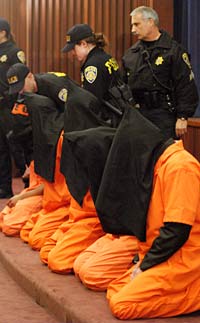UC Berkeley Press Release
 Panelists at the School of Law symposium on "The Next President and the Courts" included (from left) Democratic consultant Susan Estrich, law professor Jesse Choper, former Bush aide William Kelley, and moderator John Yoo, a Berkeley law professor who also worked in the Bush administration. (Peg Skorpinski photos) |
The commander-in-chief and the courts
Legal experts discuss the
44th president's potential role in shaping the
federal judiciary
BERKELEY – The winner of the 2008 presidential election will potentially shape the future composition of the U.S. Supreme Court. This aspect of the presidential contest, infrequently discussed in media coverage of the primaries, took center stage Feb. 21 at the UC Berkeley School of Law, where a group of legal experts discussed "The Next President and the Courts."
Representing views from both the liberal and conservative camps, the evening featured longtime Democratic consultant Susan Estrich; Republican William Kelley, former deputy White House counsel for George W. Bush; and Berkeley law professor Jesse Choper, the group's putative "independent." Serving as moderator was Berkeley law professor John Yoo, a former high official at the Justice Department — whose role there in crafting legal justification for broad presidential powers in the "war on terror" was loudly denounced by about a dozen protesters in orange "detainee" jump suits and pointed black hoods. A handful were escorted out by UC police as they knelt en masse near the stage.
 Protesters denouncing John Yoo's role in legitimizing many of the Bush administration's actions in its "war on terror" are removed from the Booth Auditorium stage by UC police. |
Not only the Supreme Court, but the federal district courts and the U.S. Court of Appeals are "crucial at this time," Estrich added. Fundamental rights are at stake, and they're "more at stake in the day-to-day decisions that are made by federal judges … than by the relatively small handful of decisions that get made by the U.S. Supreme Court."
The high court presently consists of four justices each in the liberal and conservative camps, with Anthony Kennedy breaking the tie on controversial issues. By Choper's count, the three justices most likely to step down during the next presidency — John Paul Stevens, who is about to turn 88, Ruth Bader Ginsberg, and David Souter — are all liberals.
While that sounds like a bit of math that would energize voters of all stripes, Estrich predicted that the president's power to select Supreme Court justices will not get any traction with the electorate. A veteran of numerous election campaigns —including the 1988 Dukakis presidential campaign, which she managed — Estrich said it "never works" to try to make the president's judicial-nominating power into a voting issue. "It's like beating your head against a brick wall."
A nominee to the high court is only halfway home, of course; he or she must then win confirmation by the U.S. Senate. In his role at the White House, Kelley helped prepare both John Roberts and Samuel Alito for their confirmation hearings. Based on that experience, he argued for "excellence of the nominee" as the best way to beat back inevitable opposition — making it "very hard for the media" or others to "take them down."
The panelists agreed that the Senate confirmation process for judgeships has grown increasingly partisan, making it harder for anyone who has taken a stand on controversial issues to pass muster. "We'd be better off," Kelley said, "if both sides, within reason, would let people through whom they might not like."
"If we get milquetoasts on both sides … that's not what we need," added Estrich. There are important moments in the nation's history, she said, when "you need somebody who can really stand up and say 'no.' … I worry that we've made a lot of people of stature into untouchables."
A webcast of "The Next President and the Courts" will be available soon on webcast.berkeley.edu, as well as on UC Berkeley's portals on YouTube and iTunes U.
